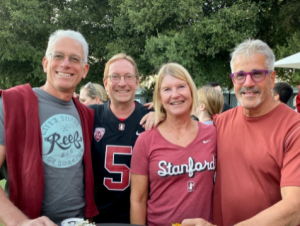
Happy Monday, Friends of TVD!
Again, I hope this message finds you enjoying our updated newsletter, with its new look, non-COVID content, and guest authorship. Regarding the latter, we have been reaching out to our trusted colleagues to ask them to share their thoughts with you in this space. I hope you find their contributions both interesting and valuable. Let me add that all of this content gets added weekly to our “Blog”, as well as pushed out to our social media channels. I encourage you to visit our webpage (and make use of the “search” functionality!), as well as our Facebook, LinkedIn, and Instagram pages. Spread the word. 😇
As you can see below, this issue is devoted to “eye health”. Even though National Vision Month was in May, it is never too late to follow the guidelines described below. On top of that, it is beautiful outside, so get off your screens (Zoom be gone!) and enjoy nature. Your eyes will thank you. And don’t forget your sunscreen. Note that your eyes don’t like too much sun exposure either, so for your longer outings, consider a hat and sunglasses!
Lastly, and with a heavy heart, I must share the news of the death of my friend and colleague, Dr. Paul Auerbach. What a man, an inspiration, a role model for me, a fantastic father to Danny, Brian, and Lauren, and an equally devoted and loving husband to Sherry. Love you all. Please read more in my The Village Square section below.
Namaste, Paul, you will be missed, and forever loved.
In health and adventure,
Eric Weiss, MD, July 1, 2021

Paul and Sherry Auerbach (right), another friend and colleague, Dr. Dan Guenin (left), in 2019

NOTE: Our TVD Newsletter is a labor of love. If you enjoy reading this, please share widely! Was this forwarded to you by a friend? Please subscribe here.

WHAT IS COMPUTER VISION SYNDROME AND IS THERE A WAY TO EASE IT?
So many of us have lives that require us to stare at digital screens for hours each day. Some studies show the average American worker spends 7 hours a day on the computer either in the office or working from home, which doesn’t take into account other screen time (e.g. tablet or phone use outside of work). Eye problems caused by prolonged use of digital screens fall under the heading ‘computer vision syndrome,’ also known as, ‘digital eye strain.’ Symptoms may include blurred vision, double vision, dry or red eyes, eye irritation, headaches or neck pain... Read more

Guest Authorship: WHY THE EYE EXAM IS AN ESSENTIAL MEDICAL EVENT IN YOUR LIFE
While it is debatable that the eyes are the “window to the soul,” they are most definitely a snapshot of your overall health. One can think of the eye as an intersection of virtually every system in the body, a true microcosm of total human health. In fact, over 300 systemic diseases can be picked up during an eye exam.
What is so special about the eye exam? The eye is the only organ in the body where we have an unobstructed view of blood vessels, nerves, connective tissue and to some extent muscle. Unlike every other exam in medicine where you are indirectly assessing the health of the tissue, eye care professionals can directly observe these tissues in action. For example, we can literally observe red blood cells pulse through the blood vessels, detect white blood cells floating around in the eye fluid, and examine brain tissue in all its glory (the optic nerve is an extension of the brain). This affords ophthalmologists “superpower” diagnostic skills to detect systemic diseases that present in the eye... Read more


HOW CAN I HELP PROMOTE MY CHILD’S EYE HEALTH?
When a baby is first born, their vision is thought to be 20/400, but within a few months after birth, a baby’s vision becomes more clear and by age 3 – 4 years, they typically have 20/20 vision. As a parent, one of your many jobs is to help them develop healthy vision and then to keep their eyes healthy and safe as they grow and reach their vision milestones. Your pediatrician will also do age-appropriate eye screening exams to monitor for any problems, but parents tend to be the ones who catch more subtle issues and should bring up any questions or concerns they may have. In our office, we use Go Check Kids starting at age 1 so that we can do vision screenings years before a child can cooperate with a vision chart… Read more



I could fill up many newsletters describing Paul Auerbach’s contributions to his friends, family, and the world. Co-founding the Wilderness Medicine Society (WMS), being my Chairman of Emergency Medicine at Stanford (and working hard to get Emergency Medicine its well deserved “department” status). Paul also published the now iconic Textbook of Wilderness Medicine (amongst many other publications, including a beautiful book of underwater photography, Diving the Rainbow Reefs, and a novel called Bad Medicine which he swears was not based on any of the many characters at Stanford). Paul was also always of service, being early on the ground in Haiti after their devastating earthquake in 2010, and 5 years later again on the ground in Kathmandu helping colleagues, friends, and the broader community after Nepal’s terrible earthquake in 2015.
I cannot say enough about how proud I am of my relationship with the Auerbach family nor how my heart breaks from the loss of Paul. I am trying to be inspired to channel Paul’s love and work on making the world a better place. We should all do that.
For those who wish to donate in his memory, donations can be directed to the Wongchu Sherpa Memorial Hospital Project Fund via the Wilderness Medical Society: https://wms.org/donation/wongchhu/default.asp.
Again, our TVD Newsletter is a labor of love. If you enjoy reading this, please share widely! Was this forwarded to you by a friend? Please subscribe here.
*****
Yours, in health and resilience,
Eric and the TVD MD team…




